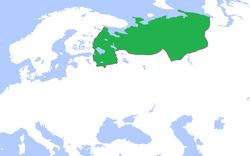Republic of Novgorod
| Novgorod Republic | ||||||||||||
| Новгородскаѧ земьлѧ Novgorodskaya Zemlja |
||||||||||||
|
||||||||||||
|
The Novgorod Republic c. 1400
|
||||||||||||
| Capital | Novgorod | |||||||||||
| Languages | Official languages: Old Novgorod Dialect, Old Church Slavonic Unofficial languages: Germanic languages Uralic languages |
|||||||||||
| Religion | Eastern Orthodoxy | |||||||||||
| Government | Mixed merchant republic | |||||||||||
| Prince | ||||||||||||
| • | 1136–1138 (first) | Sviatoslav Olgovich | ||||||||||
| • | 1462–1478 (last) | Ivan III | ||||||||||
| History | ||||||||||||
| • | Established | 1136 | ||||||||||
| • | Disestablished | 1478 | ||||||||||
|
||||||||||||
| Today part of |
|
|||||||||||
The Novgorod Republic (Russian: Новгоро́дская респу́блика, tr. Novgorodskaja respublika; IPA: [nəvgɐˈrotskəjə rʲɪsˈpublʲɪkə]; Old Church Slavonic: Новгородскаѧ землѧ / Novgorodskaję zemlę) was a medieval East Slavic state from the 12th to 15th centuries, stretching from the Baltic Sea to the northern Ural Mountains, including the city of Novgorod and the Lake Ladoga regions of modern Russia. Citizens referred to their city-state as "His Majesty (or Sovereign) Lord Novgorod the Great" (Gosudař Gospodin Velikij Novgorod), or more often as "Lord Novgorod the Great" (Gospodin Velikij Novgorod). The Republic prospered as the easternmost port of the Hanseatic League.
In the middle of the 9th century Novgorod was only a name used to describe a staging post on the trade route from the Baltic Sea to the Byzantine Empire. It was populated by various Finnic and Slavic tribes that were constantly at war with one another for supremacy. However, these tribes came together during the beginning of the 9th century to try and form a negotiated settlement to end military aggression between each other. The Novgorod First Chronicle, a collections of writings depicting the history of Novgorod from 1016-1471, states that these tribes wanted to “Seek a prince who may rule over us and judge us according to law.” By transforming its governing institutions, Novgorod rejected its politically dependent relationship to Kiev.
Novgorod functioned as the original capital of the Rus' people until 882 when Oleg transferred his administration to Kiev. From that time until 1019-1020 Novgorod was a part of Kievan Rus'. Novgorod Princes were appointed by the Grand Prince of Kiev (usually one of the elder sons). Novgorod was sort of a spiritual center as by legend it was the first city of Rus'. Novgorod still possesses relics of the traditional beliefs that preceded Christianity and are now part of their pre-Christian Pagan/Norse/Slavic history.
...
Wikipedia

